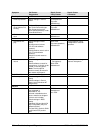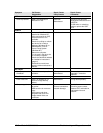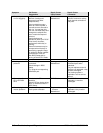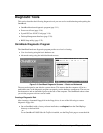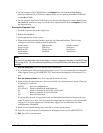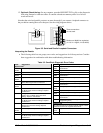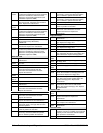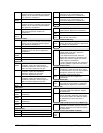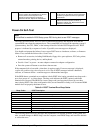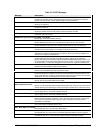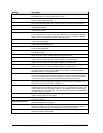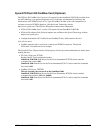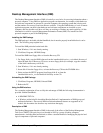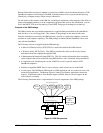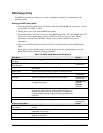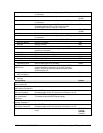
3-16 Troubleshooting and Diagnostics HP OmniBook 2100/3000/3100
9009h Do not run this test in Windows. For the one-
unit test, replace the motherboard. For the two-
unit test, make sure the IR ports on the
reflector and test computers are lined up,
replace the IR PCA, replace the motherboard.
900Ah Rerun the test. For the two-unit test, make sure
the IR ports on the reflector and test computers
are lined up. Replace the IR PCA, replace the
motherboard.
900Ch Rerun the test. Make sure the IR ports on the
reflector and test computers are lined up.
Restart the reflector unit. Replace the IR PCA,
replace the motherboard.
Power-On Self-Test
Note
If Quiet Boot is enabled in BIOS Setup, press ESC during boot to see POST messages.
The POST (Power-On Self-Test) is a series of initialization routines and diagnostic tests that the
system BIOS runs when the computer boots. The system BIOS will not boot the operating system if
system memory, the CPU, DMA, or the interrupt controller fails the POST diagnostic tests. POST
progress is indicated by a sequence of codes. If possible, error messages are displayed.
You should not interpret the failure of one or more POST tests as a hardware, software, or firmware
failure. First, confirm the failure with a “clean” boot:
• Remove all accessories, including RAM boards, floppy drive, port replicator, PC Cards, printer,
external monitor, pointing device, and keyboard.
• Provide “clean” ac power—no auto adapter or unusual ac adapter configuration.
• Press the system-off button to start from a known state.
If the computer fails to boot with a clean boot, it requires repair. If an error message is displayed,
confirm the problem using other diagnostic tools. Not all POST messages indicate a hardware,
software, or firmware failure—some messages are informational messages.
If the BIOS detects a terminal error condition, it halts POST after issuing a terminal error beep code—
up to four groups of 1 to 4 short beeps. The beep code indicates the POST routine in which the
terminal error occurred. The BIOS also issues a beep code (one long tone followed by two short
tones) during POST if the video configuration fails (no card installed or faulty) or if an external ROM
module does not properly checksum to zero.
Table 3-4. POST Terminal-Error Beep Codes
Beep Codes POST Description
1 One short beep before boot
1-2 Search for option ROMs. One long, two short beeps on checksum failure
1-2-2-3 BIOS ROM checksum
1-3-1-1 Test DRAM refresh
1-3-1-3 Test 8742 Keyboard Controller
1-3-4-1 RAM failure on address line xxxx
1-3-4-3 RAM failure on data bits xxxx of low byte of memory bus
1-4-1-1 RAM failure on data bits xxxx of high byte of memory bus
2-1-2-3 Check ROM copyright notice
2-2-3-1 Test for unexpected interrupts
The following table lists POST messages and explanations for reported problems. If the system fails
after you make changes in BIOS Setup, reset the computer, enter BIOS Setup, and install the defaults
or correct the error.



